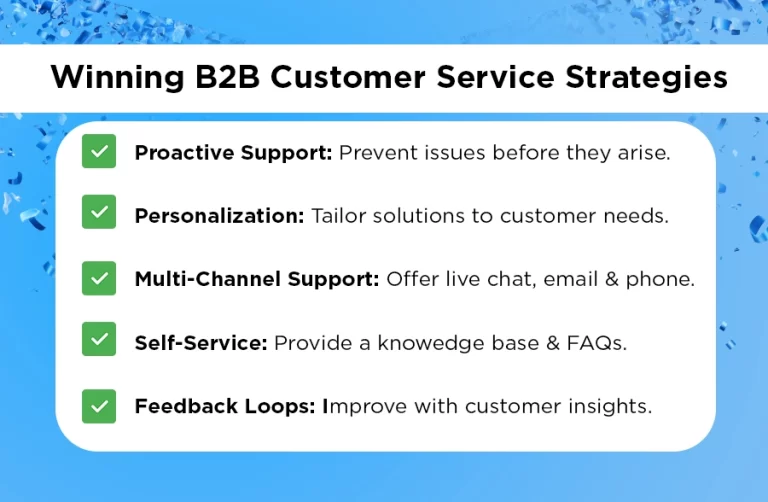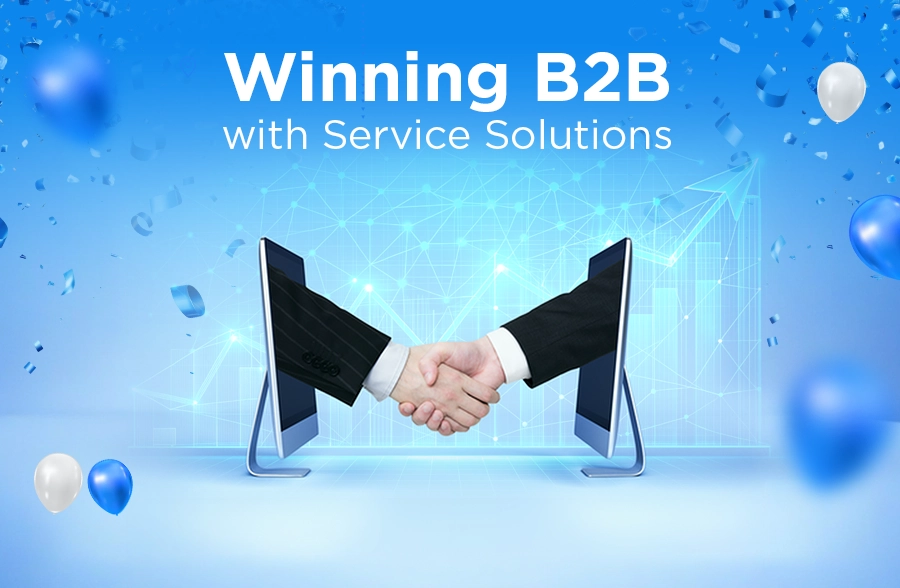Schedule a FREE call with our outsourcing expert now and get a precise quotation that meets your requirements. Don't wait - get started today!
Good customer service isn’t just a nice-to-have—it’s a necessity. In the B2B world, where relationships take time to build, and contracts can last years, the way you treat your clients can make or break your success.
Think about it: Would you trust a business that takes days to respond to your inquiries? Or one that makes you repeat your concerns to multiple representatives? Probably not. That’s why B2B companies must go beyond quick fixes and focus on long-term customer service strategies that foster trust, reliability, and efficiency.
So, how do you build a customer service approach that not only meets expectations but exceeds them? Let’s break it down.
Why B2B Customer Service is Different
B2B transactions involve longer sales cycles and multiple decision-makers, making the customer journey more complex. Businesses evaluate purchases carefully, often requiring extensive research, consultations, and approvals before finalizing a deal.
Unlike B2C, where purchases are often impulsive, B2B transactions are strategic investments that require trust and ongoing support. Companies expect a high level of expertise from service teams, as their purchases directly impact operations and profitability.
Clients also expect personalized service and knowledgeable representatives who understand their industry. Generic responses won’t suffice—B2B customers need tailored solutions, proactive problem-solving, and a deep understanding of their unique challenges.
Common Challenges in B2B Customer Service
Handling complex queries is a major challenge. B2B customers often require in-depth technical support, making it essential for representatives to have strong product knowledge. Additionally, managing multiple communication channels while maintaining consistency can be difficult. Aligning customer service with business goals ensures long-term client retention.
1. Handling Complex Queries
B2B customers often require in-depth technical support, making it essential for representatives to have strong product knowledge. Unlike B2C interactions, these queries can involve intricate details, requiring agents to collaborate with different departments for accurate solutions.
2. Managing Multiple Communication Channels
Providing consistent support across phone, email, live chat, and other platforms can be difficult but is necessary for customer satisfaction. A seamless omnichannel experience ensures that customers receive timely assistance, regardless of their preferred communication method.
3. Ensuring Service Consistency
Maintaining uniform responses and service quality across different touchpoints is crucial for building trust. Standardized processes, knowledge bases, and training programs help customer service teams deliver accurate and reliable information.
4. Aligning Customer Service with Business Goals
Customer service should not only resolve issues but also contribute to long-term client retention and business growth. A well-structured support system can improve customer loyalty, increase upselling opportunities, and enhance brand reputation.
Key Customer Expectations in B2B
B2B clients expect fast and accurate responses. They value proactive communication, personalized solutions, and ongoing support. A one-size-fits-all approach does not work in this setting. Businesses must anticipate client needs and provide tailored assistance.
1. Fast and Accurate Responses
B2B clients operate in high-stakes environments where delays can impact operations and revenue. They expect prompt replies to inquiries, with accurate information that helps them make informed decisions. Slow or incorrect responses can lead to frustration and lost trust, making efficiency a critical factor in customer service.
2. Proactive Communication
Unlike B2C customers who reach out when they need assistance, B2B clients expect service teams to be proactive. Businesses must anticipate issues before they arise, providing updates on potential challenges, product improvements, or service changes. Regular follow-ups and check-ins demonstrate reliability and commitment to client success.
3. Personalized Solutions
A one-size-fits-all approach does not work in B2B customer service. Clients have unique requirements based on their industry, company size, and operational needs. Service teams must understand these factors and provide tailored solutions that address specific challenges. Customization enhances customer satisfaction and fosters long-term partnerships.
4. Ongoing Support and Relationship Building
B2B relationships are built on trust and long-term collaboration. Clients expect continuous support beyond the initial sale, including training, troubleshooting, and strategic guidance. Businesses that invest in long-term customer success create loyal clients who are more likely to renew contracts and recommend services to others.
Proactive Strategies to Improve B2B Customer Service
Businesses that prioritize customer service build lasting relationships and increase retention. Here’s how you can enhance your B2B support system.
-
Implement a Dedicated Account Management System
Assigning dedicated account managers ensures that clients have a direct point of contact for all their concerns. Account managers build relationships, understand business needs, and offer tailored solutions. They also track customer interactions to anticipate future needs.
-
Optimize Communication Channels
Offering multiple communication options enhances accessibility. Live chat provides instant support, while email and phone support handle more detailed inquiries. A knowledge base allows clients to find quick answers to common questions without needing direct assistance.
-
Personalize the Customer Experience
Personalization improves customer satisfaction. Businesses should analyze past interactions to provide relevant recommendations. Addressing clients by name and understanding their business goals builds trust and strengthens relationships.
-
Train Your Team on Soft and Technical Skills
Soft skills, such as active listening and empathy, are crucial for handling client concerns effectively. Additionally, representatives must possess deep product knowledge to provide accurate solutions. Continuous training ensures a high level of service quality.

Technology-Driven Solutions for B2B Customer Service
Automation and digital tools streamline customer support and improve efficiency.
1. AI-Powered Chatbots for 24/7 Support
AI-driven chatbots handle repetitive inquiries, direct customers to the right department, and free up agents for more complex issues. This ensures that clients receive immediate assistance even outside business hours.
2. CRM Systems for Better Relationship Management
A robust CRM system stores and tracks customer interactions, helping businesses maintain strong relationships. CRM analytics provide insights into client behavior, allowing companies to anticipate and meet their needs more effectively.
3. Feedback Loops for Continuous Improvement
Regular feedback collection helps businesses identify service gaps. Surveys and reviews provide direct insights into customer satisfaction. Acting on feedback fosters trust and enhances service quality.
4. Data Analytics to Predict Customer Needs
Using data analytics, businesses can identify patterns in service requests and address potential issues before they escalate. Real-time insights improve decision-making and customer satisfaction.
Measuring Customer Service Success in B2B
Tracking performance ensures continuous improvement. Key performance indicators (KPIs) help businesses assess their service effectiveness.
Key Performance Indicators (KPIs) to Monitor
- First Response Time – How quickly are customer inquiries addressed?
- Resolution Rate – Are issues resolved on the first attempt?
- Customer Satisfaction Score (CSAT) – How do clients rate the support?
- Net Promoter Score (NPS) – Will clients recommend your service?
According to a study, 86% of B2B buyers are willing to pay more for a great customer experience. This highlights the importance of investing in customer service strategies.
Best Practices for Evaluating Performance
Regularly reviewing service metrics helps businesses refine their approach. Internal training should be based on feedback and service trends. Benchmarking against industry standards ensures competitiveness.
-
Regularly Review Service Metrics
Tracking key performance indicators (KPIs) such as response time, resolution rate, and customer satisfaction scores provides valuable insights into service effectiveness. Businesses should analyze trends over time to identify strengths and areas for improvement.
Companies can consistently monitor these metrics to refine their approach and ensure their customer service teams meet evolving client expectations.
-
Use Feedback to Improve Training
Internal training should not be static—it must evolve based on customer feedback and service trends. Collecting feedback through surveys, reviews, and direct client interactions helps businesses identify common pain points and knowledge gaps.
Companies can use this data to develop targeted training programs to enhance employee skills, improve service consistency, and align customer interactions with business goals.
-
Benchmark Against Industry Standards
Comparing performance metrics to industry benchmarks ensures a company remains competitive. Businesses should assess how their customer service measures up against competitors in terms of response time, resolution efficiency, and customer satisfaction.
Benchmarking provides a clear picture of where improvements are needed and helps set realistic goals for service excellence.
Strengthen Your B2B Customer Service Today
Your customers deserve top-tier support, and we’re here to make that happen. Book your FREE 60-minute business consultation today—no commitments, just actionable insights tailored to your needs!
At Magellan Solutions, we provide expert customer service outsourcing designed specifically for SMEs. Our dedicated support teams are trained to understand your industry, ensuring personalized and knowledgeable assistance for your clients. We offer seamless omnichannel customer service, allowing businesses to engage customers across multiple platforms without losing consistency.
Additionally, our AI-driven automation enhances efficiency, streamlines processes, and reduces response times. Whether you need multilingual support or industry-specific expertise, our Italian call center Philippines operations ensure high-quality service tailored to your business needs.
Let’s work together to build stronger client relationships, improve retention, and drive business growth. Contact us today and take your customer service to the next level!
















